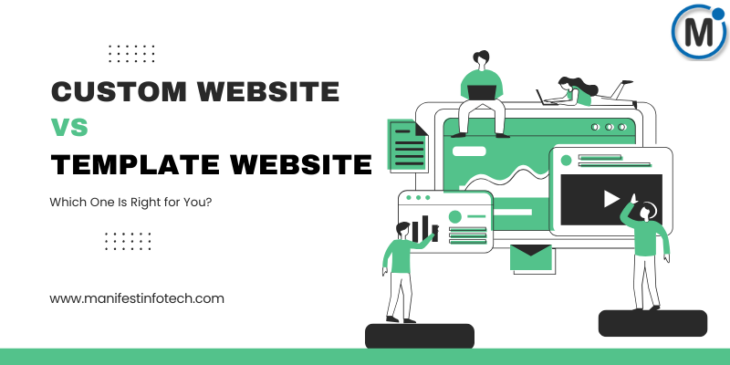
When launching a new website for your business, one of the first and most important decisions you’ll face is choosing between a custom website and a template-based website. Both options have their pros and cons, and the right choice depends largely on your business goals, timeline, and budget. Let’s dive deeper into both approaches to help you make an informed decision.
Custom Website: Tailored for Your Brand
A custom website is built from scratch, designed specifically around your brand’s identity, target audience, and unique functionality needs.
Advantages of Custom Websites:
Unique Design: No two custom websites are the same. Your site is crafted to reflect your brand’s voice and values perfectly.
Scalability: As your business grows, your custom website can be easily expanded with new features and integrations.
Better SEO: Custom websites are optimized for search engines from the ground up, offering better performance and higher rankings.
Advanced Functionality: If you need complex features like custom forms, membership systems, or unique user experiences, custom development is the way to go.
Disadvantages:
Higher Cost: Custom websites typically require a larger investment, often ranging from $5,000 to $50,000 depending on complexity.
Longer Development Time: Building from scratch takes time, with projects often lasting several weeks or months.
Template Website: Fast and Budget-Friendly
A template website uses pre-designed layouts and themes, which you can customize to a certain extent to fit your business needs.
Advantages of Template Websites:
Lower Cost: Template websites are significantly cheaper, with many quality options available for as low as $50 to $500.
Faster Launch Time: With a ready-made design, you can have a website up and running in a matter of days.
Ease of Use: Platforms like WordPress, Wix, and Shopify offer templates that are easy to set up without heavy technical knowledge.
Disadvantages:
Limited Customization: While templates can be edited, they have limitations. Your website might end up looking similar to others using the same template.
Scalability Issues: Templates may struggle to handle growing functionality needs as your business expands.
Generic SEO Setup: Templates often come with bloated code or poor optimization, affecting your site’s performance and SEO.
Which One Should You Choose?
If you are a startup or small business needing a fast, affordable online presence, and you don’t require extensive custom features, a template website could be the perfect solution. It allows you to establish your brand online quickly while keeping costs low.
However, if you are serious about building a strong, distinctive brand, expect significant growth, or require specialized functionality, investing in a custom website is a smart move. It offers flexibility, a unique user experience, and long-term value.
Final Thoughts
Choosing between a custom website and a template website ultimately depends on your vision, budget, and growth plans. Take time to evaluate your immediate needs and future goals before making a decision. Remember, your website is often the first impression your audience will have of your business — make sure it’s the right one.
If you are looking for any services related to Website Development, App Development, Digital Marketing and SEO, just email us at nchouksey@manifestinfotech.com or Skype id: live:76bad32bff24d30d
𝐅𝐨𝐥𝐥𝐨𝐰 𝐔𝐬:
𝐋𝐢𝐧𝐤𝐞𝐝𝐢𝐧: linkedin.com/company/manifestinfotech
𝐅𝐚𝐜𝐞𝐛𝐨𝐨𝐤: facebook.com/manifestinfotech/
𝐈𝐧𝐬𝐭𝐚𝐠𝐫𝐚𝐦: instagram.com/manifestinfotech/
𝐓𝐰𝐢𝐭𝐭𝐞𝐫: twitter.com/Manifest_info
#CustomWebsite #TemplateWebsite #WebDesign #WebsiteDevelopment #BusinessWebsite #DigitalMarketing #BrandIdentity #WebsiteLaunch #OnlinePresence #WebDevelopmentTips